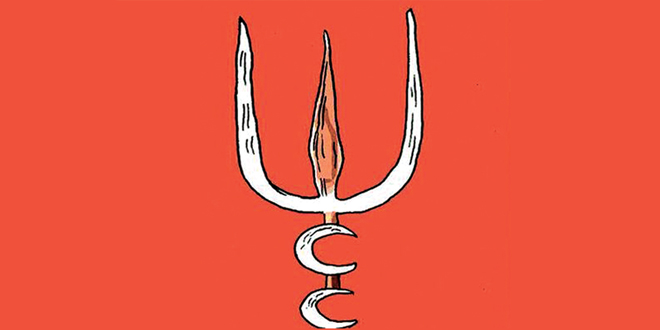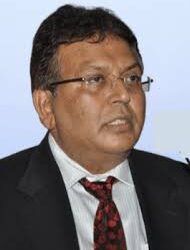K.Veeramani, President, Dravidar Kazhagam
UCC must be equitable ; without codifying the discriminative, gender injustice ridden Hindu Personal laws, debating on UCC is a discursive excercise , intra religious codification must precede inter religious coding endeavors
Background :
In the 70 year old independent India, whenever the apex court pronounces a verdict, deviating from the provision of personal laws of religious minority, it is customary to invoke Article 44 of the Indian Constitution and direct the State to endeavour for the enactment of Uniform Civil Code. On the side of the Government it is also customary to pronounce something either to sustain the effect of the related personal law or to bring a slight change in it, of course of very rarity. This is the usual approach at the apex level of the Sate Governance which is being exploited at maximum to the political advantage of the people’s representatives who have been mandated to rule the country. This approach has been adopted by all the political parties, mandated to rule at the Centre either with absolute majority or in coalition with the support and participation of other parties.
But at present the ignition, started by the BJP, on the need of Uniform Civil Code is different in the sense, the rulers are committed to the ideological cause of RSS, which has not contested the elections, explaining its ideological orientation. The RSS ideology viz. Hindutva, through the political mask of BJP, is translated which is against the principle of democracy. The prime functionary of RSS may become the top level functionary of BJP. When such a ruling party at the Centre takes initiatives to bring Uniform Civil Code, the citizens of the country have to be cautious and careful without taking into account the face value of UCC which may appear to deliver gender justice.
No doubt, it is reformation of religious laws. If the reformation is lopsided i.e. bringing to reform only the personal laws of religious minority, the intention of the rulers have to be analysed. Mere verbal proclamation to reform the Hindu Personal laws, whose religious identity is based on the non-preference to other religious belief, on one side, and rhetoric talk with great commitment to the alleged reforming the Personal Law of minority religion viz. Muslim exposes the ill intention of the Central rulers. The commitment to the cause of Hindutva by BJP is known and BJP also feels pride in getting identified with Hindutva.
Despite the pluralistic nature of Indian society, oriented more on religious background, Indian Constitution points out the nature of Governance of the State as Secular. If Government is genuine in addressing the inequities, prevailing in the personal laws of various religions, it has to be neutral. But the at present ignition towards Uniform Civil Code has been commenced by BJP by attacking the divorce mode viz. triple talaq, adhered by the majority in Muslim community in the country. The launching is said to aim at gender justice, to protect the interests of Muslim women. In fact, the gender injustice is more in Hindu religion in relative terms. Divorce was not to be talked of in Hindu religion; It patronises widowhood, an inhuman way of leading life. Widow re-marriage was not permitted. The remnants of such practices of women enslavement still persists in form of denial of entry of women into certain temple by quoting the menstruation cycle which is basically biological but considered as the means of polluting the sanctity of the temple. The entry to worship is denied even for the male members belonging to lower sects in many temples. The archakas, hailing from only one sect, considered of supreme order are appointed. The other sects, despite their due qualification and training in agamas are not appointed. When injustice of this much magnitude prevails in Hindu, the change is advocated in terms of Muslim divorce process, under the guise of supporting gender justice.
Secular Laws:
In respect of Criminal laws, from the level of award of varied punishments for the same offence, committed by different sects belonging to same religion viz. Hindu, Uniform Criminal Code was formulated and put into practice; it was not as a reform measure, promoted by the protagonists of Hindu religion. On the side of Civil Laws, uniformity has been brought into practice at large. In respect of Personal Laws, uniformity has to be arrived at. When Personal Laws are oriented on religion, besides reforming them, enactment of and practice of Secular Laws in respect of day to day practices have become acceptable. Transfer of Property Act, 1882, Guardians and Wards Act, 1890, The Special Marriage Act 1954, The Residential Tenancies Act 2004, The Protection of Women from Domestic Violence Act 2005, The Protection of Children from Sexual Offences Act, 2012, The Sexual Harassment of Women at Workplace (Prevention, Prohibition and Redressal ) Act, 2013 are applicable to all persons, irrespective of their religious identity of the persons. The religious subjects get the protection, redressal and avail the merits of the said secular laws in respect of various practices, carried out by them.
Free will and mutual consent are the binding forces for the endurance of the marriage. When there is no scope of sustaining it, divorce becomes inevitable. In Hindu religion, married woman despite harassment and ill-treatment, meted out, had to be with the family of her husband. In Muslim religion, divorce provisions and remarriage of woman – divorcee and widow have been permitted even 1500 years back. Not only have the men, even the married women got the right to demand divorce. Muslim women have been placed in a better manner in comparative terms with Hindu women. Under such circumstances, without initiating any constructive or corrective reform in Hindu religion on gender equity front, pinpointing the inequities in Muslim law does not speak sound on the part of the present rulers of secular state. It exposes explicitly the one sided, discursive approach with the sole motive of bringing changes in the Muslim Personal Laws.
Invariably all the religions treat their women folk below the level of men, of course in varied degrees. If any government tries to advocate gender justice equally, it has to be religion neutral, with sincere attempt both in thought and action to abolish the gender injustice. Without understanding and valuing this reality, any attempt in the name of bringing ‘Uniform Civil Code’ will weaken the social fabric of the nation.
UCC, its challenges and relevance to the whole of India:
The protagonists of UCC say that it has been emphasized in Article 44 of the Indian Constitution which comes under the Directive Principles of State Policy.
“The State shall endeavour to secure for citizens a uniform civil code throughout the territory of India”.
Many of the vital provisions highlighted in the Directive Principles of State Policy were not prioritised for accomplishment like ‘Education to All’ (Article 45), ‘Prohibition of liquor’ (Article 47) etc., which are not justiciable at present. Judiciary has also not directed the Government seriously to pay their attention on those state policies. But undue importance is paid and the religious minority is targeted by the Central rulers in bringing UCC; practically it is not that much easy. The Constitution itself has inhibitive provisions. UCC cannot be uniform and applicable to the whole of the country. Any prospective legislation related to customs, traditions, family laws cannot be enforceable in North Eastern states like Nagaland (Article 371 A) and Mizoram (Article 371 G), unless they are passed in their respective State legislatures. Such sort of immunity is available to those States (due to their placement in Schedule VI of the Constitution), in respect of the personal laws enacted by Indian Parliament in the name of accomplishing Uniform Civil Code.
When challenges are ahead, intra-Constitution, how the Central rulers can be rhetoric in commenting the divorce law of Muslim religion, shedding crocodile tears for the well-being of Muslim women. Let the rulers sympathize for the state of social conditions of the Hindu women folk who form the majority and try to bring gender equality intra-religion (Hindu). Let them reform the personal laws, which remained silent on the forced death of married women in the funeral pyre of their husband practised as Sati. Though it was banned legally in 1833, still glorification of this practise (still Sati is practised in certain states) in the name of Sati Matha Temple is in vogue. Not even the simple lip pronouncement, condemning the practice of Sati comes from the mouth of the rulers. Even child marriages, prohibited by law, are taking place in certain places in the North in the presence of ministers and duly elected legislative members. Instead of reforming the practices which are already prohibited by law, pinpointing the inequities available in a comparatively civilized religion will defeat the very purpose of Uniform Civil Code. Can the democratically elected rulers imitate the unwanted deed of a renounced hermit, making alarming sound by using his conch without understanding the surrounding realities?









